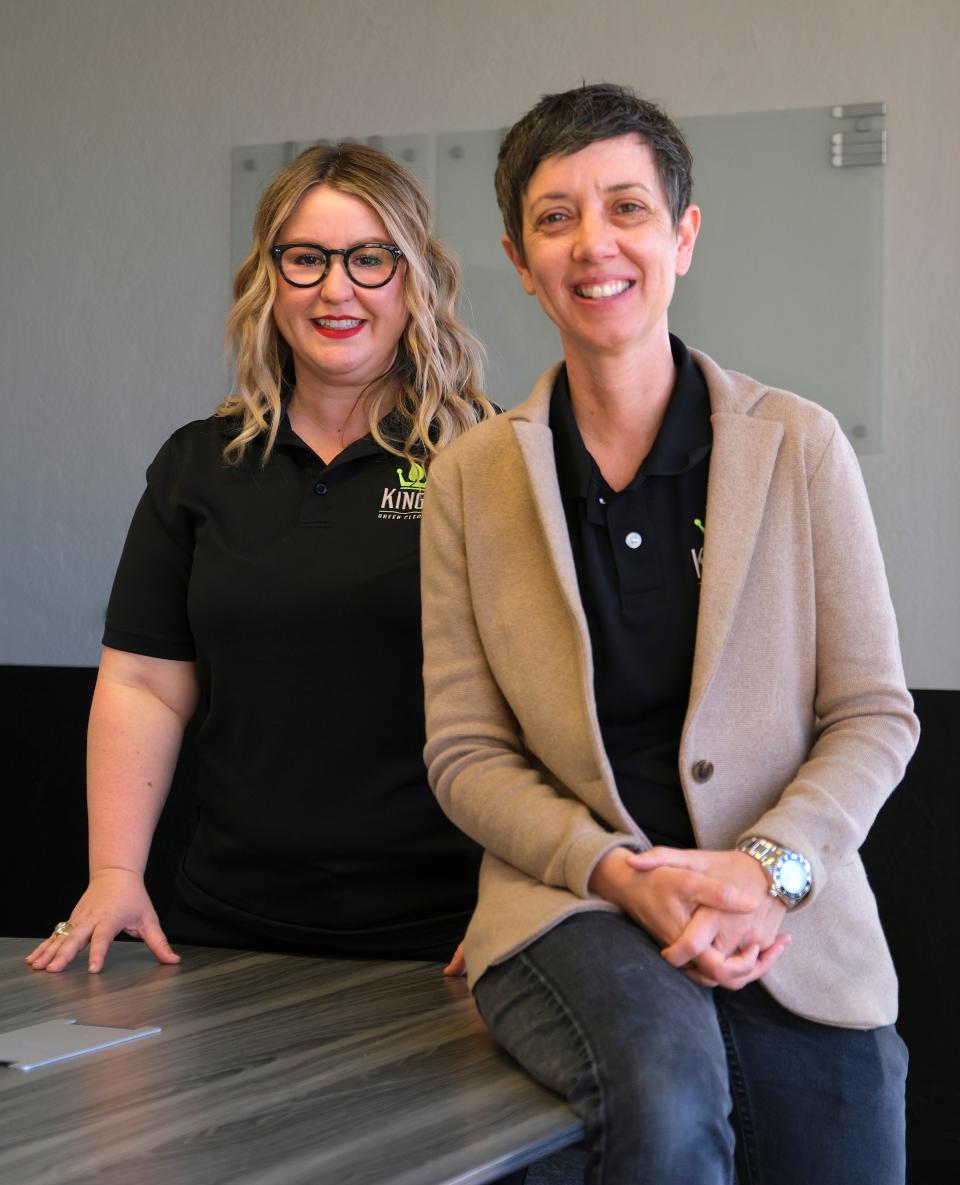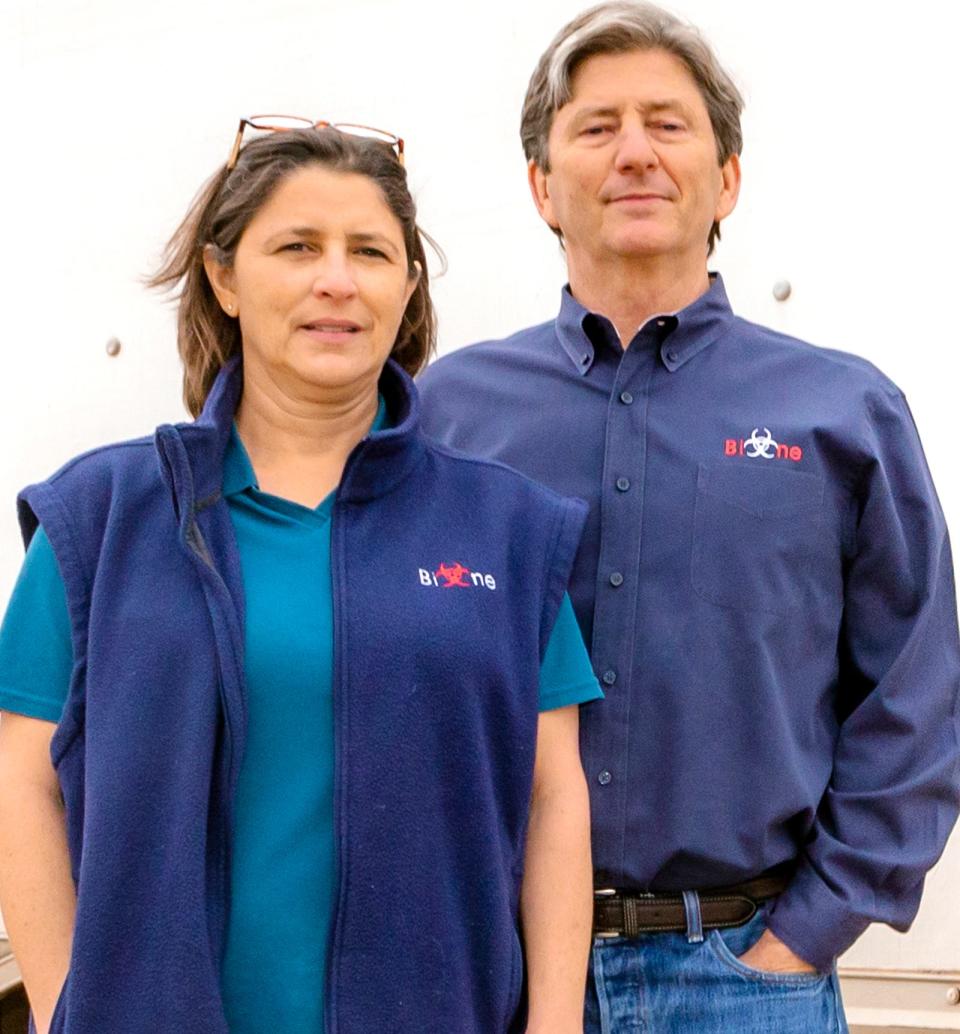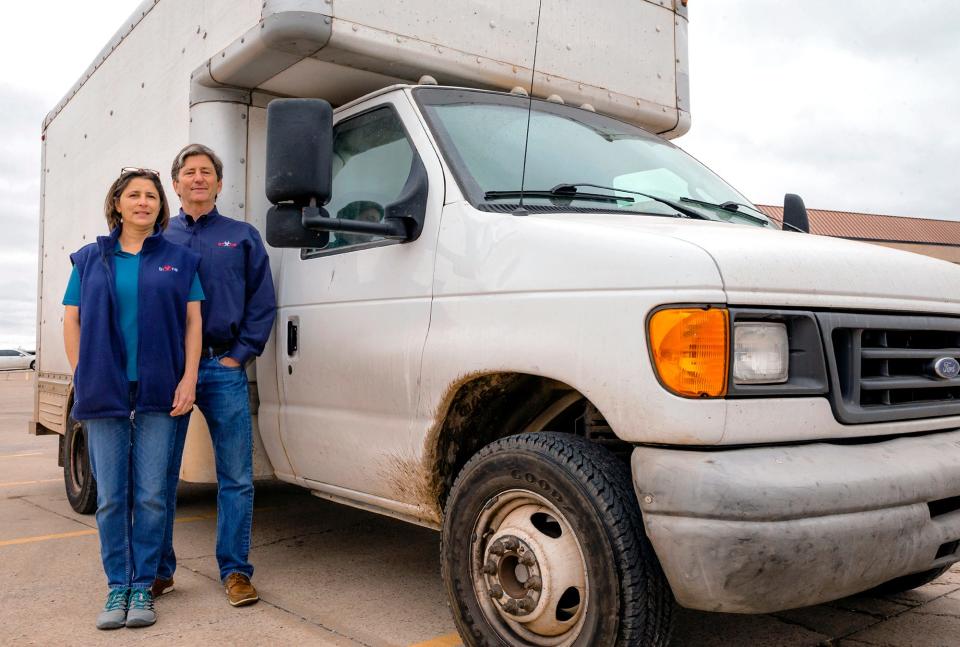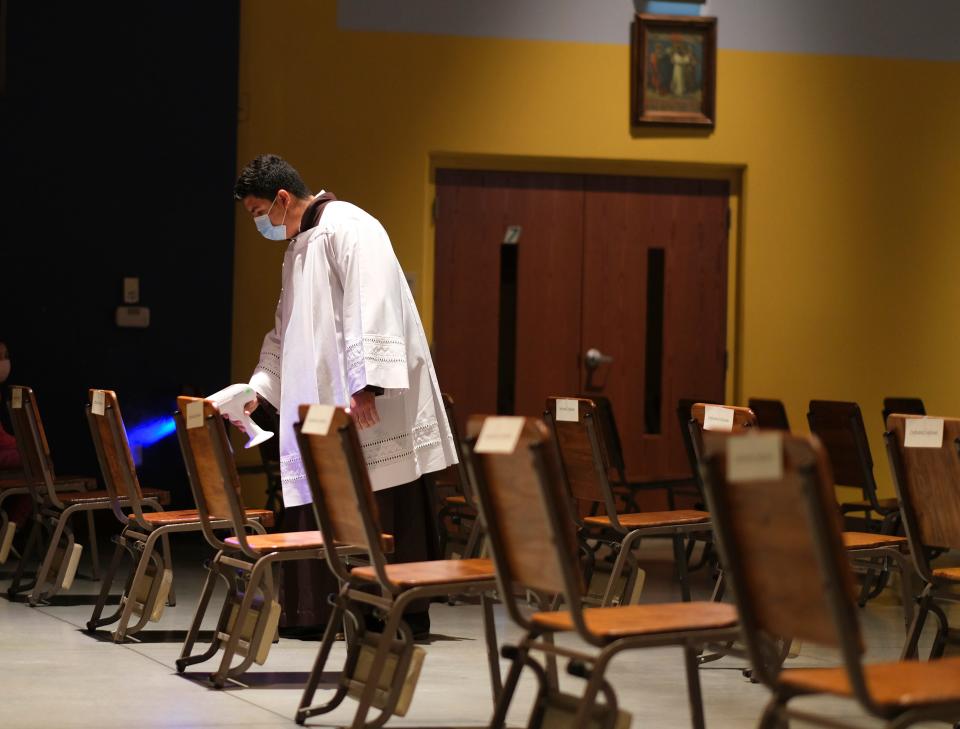Cleaning companies pivot to fill sought-after services during pandemic
When Amanda and Amy King signed the lease for their new downtown Oklahoma City office space on Couch Drive in January 2020, they were unprepared for what was soon to come.
King’s Green Cleaning had been steadily expanding for 15 years, ever since Amy started cleaning houses in the metro in 2006. Amanda, Amy’s spouse, eventually left her auditing job in corporate banking to fulfill the company’s marketing and backend operations, and the couple became full-time coworkers and co-owners of the cleaning service.
By 2019, the company had outgrown its original facility in Mesta Park, just outside of downtown Oklahoma City. In March 2020, reveling in the scenic view of the nearby Civic Center Music Hall, the Kings were finishing up decorations for the new location’s conference room, looking forward to major networking opportunities in the area.
Then the pandemic slowed everything to a halt. For the Kings, downtown might as well have been a ghost town.
More: At 2-year mark, Oklahomans reflect on how COVID-19 changed lives and future with the virus
“We were so excited, because we’d gotten this new corporate office, and everything was going to go great, but then, 12 days later, everything just shut down,” Amanda King said. “I remember the conference room table got delivered, and we sat at it and looked out at an empty scene outside. It was probably the scariest moment of our lives. Overnight, we lost half of our residential clients.”

Local cleaning companies, like every other major industry, were initially blindsided by COVID-19 disruptions. But adjustments were soon made after they realized they had commodities highly sought-after during the pandemic’s height: cleaning supplies and sanitation expertise.
Marty and Michel Mayfield, owners of Bio-One OKC and married since 1995, have decades of experience in information technology and dental hygiene, respectively. Wanting to go into business together as a couple, the Mayfields signed on as local franchisees of the nationwide Bio-One company in 2018, offering trauma cleanup and crime scene cleaning services to the metro.
When the COVID-19 emergency forced new sanitation priorities and shelter-in-place restrictions in the state, the Mayfields said they were already well-positioned with resources needed to sustain.
“Timing for us ― and this may sound bad ― was good in the sense that we already had everything to take care of COVID,” Marty Mayfield said. “We already had the electrostatic sprayers and all of the personal protective equipment and all of the chemicals that were registered with the [Centers for Disease Control and Prevention], so we were ready to go.”
Because of the Mayfields’ skill in handling hazardous situations and gruesome scenes in need of deep cleaning, various companies contacted Bio-One OKC for consultation on how to navigate the new world of COVID-19.
What started out as a freelance job of disinfecting door handles, keyboards and cubicles quickly became a full-fledged service for the Mayfields once they realized how many businesses badly needed it during the outbreak.
“That first year, we were doing disinfections at midnight, 2 a.m., 4 a.m., because businesses wanted to open the next day,” Marty Mayfield said. “So once we were through, you could enter. It’s not like they had to wait 24 hours. And we did public and private businesses, insurance companies, oil and gas companies, government agencies, assisted living facilities and private homeowners. It was just crazy.”

For King’s Green Cleaning, which mostly specializes in residential cleaning, the shift to cleaning commercial buildings was a necessary pivot when some longtime clients were hesitant to let outsiders come into their homes.
“We put some things in place that made those 50% of the clients who stayed on feel comfortable, because we were grateful that they still wanted to have us out,” Amy King said. “We had a call-in, call-out service, so there was no contact at all. On our way, we would call, the homeowner would leave, and then when we were done, we’d let them know and they’d come back. But it was the commercial business that really kept us afloat until people wanted us back in their homes.”
In addition to the owners and a sales manager, King’s Green Cleaning runs a staff of five employees who help provide services to Oklahoma City and surrounding towns. A small business loan through the Paycheck Protection Program allowed the company to pay its workers the same wages and hours despite typical revenue being cut in half, but the increase in commercial cleaning calls was also helpful.
“Because for those commercial businesses, I think they realized what we’ve always known: Cleaning is important,” Amanda King said. "We’ve always known that offices need to be cleaned, because you want your staff to have a healthy environment, less sickness, less call-ins and more productivity. And so, once COVID hit, people who didn’t realize that you needed to clean the doorknob that everybody touches every day, or the light switch plates — the things that we’ve been cleaning all along — were suddenly thinking about all of that, all the time.”
Related: Oklahoma City property managers took extra steps to protect against COVID-19
But the most difficult thing to maintain for their employees, the Kings soon discovered, was supplies.
Several PPE vendors had increased prices by 17%, and even something as commonplace but necessary as latex gloves suddenly cost as much as 10 times more than before.
![A sign on empty shelves lists limits for wipes and hand sanitizers at Target, 5400 N May Ave., in Oklahoma City, Friday, March 13, 2020. [Nate Billings/The Oklahoman]](https://s.yimg.com/ny/api/res/1.2/9tiSFtPd0erkNZ4QFq2tTg--/YXBwaWQ9aGlnaGxhbmRlcjt3PTk2MDtoPTcyMA--/https://media.zenfs.com/en/the-oklahoman/519b37017c8e9c259dad57e66c580c75)
“That was really frustrating at the beginning, too,” Amy King said. “All of the things we needed that were always a certain price were now, overnight, extremely expensive. And we had to buy them, because of course we needed them. But finding them as everybody was scrambling for them was hard enough.”
Even now, two years later, the Kings said they have not seen prices for PPE and cleaning chemicals go down, and they are uncertain if they ever will.
“I feel like once prices go up, they stay there,” Amy King said. “People are paying it, and I think they will just sit on those prices. I would be shocked if it goes back down.”
As the outbreak spread, the Kings and the Mayfields alike were astonished at the price-gouging.
“We were not going to profit off businesses just trying to stay afloat,” Amanda King said. “We were not going to take advantage of the situation, but we saw it happening all around us with a lot of the fly-by-night companies coming in. For example, with our electrostatic spraying service, we were charging $125.00, where other people were charging $2,000.00.”
The owners of Bio-One OKC said the main reason for offering their services was to assist families at their lowest moments and highest emergencies, not to charge them extravagant prices for a tough clean.
“We look at it as, we’re there to help,” Marty Mayfield said. “We’re there to resolve an issue, to help people out and move forward. It’s rewarding in that, sometimes people are in a state of mind where they’re just not sure what to do, if we can come in and help them, it’s a good feeling.”
This empathetic and compassionate approach has proven beneficial to the Mayfields, as they saw a 20% revenue increase for 2020 in comparison to 2019.
Michel Mayfield also said that homeowner’s insurance typically covers the cost of the services Bio-One provides.

Instead of a traditional building, the Mayfields operate out of an unmarked hazmat truck, eschewing branding and logos out of respect for clients’ privacy when dealing with sudden loss, including suicides and COVID-19 deaths.
“The first thing we’ve got to do is come in and assess it, because the first responders have been there to try to revive the person, and the medical examiners have come in and usually had to move things so they can get the body out,” Michel Mayfield said. “So, we’ve got to find out what was contaminated and what isn’t and where all of the biohazards are. You work your way from the outside in, get everything bagged up and treated with chemicals, and take care of it from there.”
On top of deep COVID cleans, the Mayfields saw an uptick in unattended deaths, of which a startlingly high number were young people, a pattern they attributed to the pandemic.
“Usually when we have an unattended death, they’re an older person, they’re not ambulatory, but we were getting a lot of them that were young,” Michel Mayfield said. “A lot of them had in fact contacted family members shortly before their deaths, perhaps even the day before, and passed away suddenly. We suspect it was COVID, because they had told their family members they weren’t feeling well, and they would decide to go to bed, but then died overnight.”

Now, with two years passed since the pandemic emergency was first declared and with the number of COVID cases finally receding, the Mayfields have shifted their focus back to hoarder house cleaning and trauma scene cleanup. But they would like to see many of the work environment safety policies implemented during the pandemic continue.
“There was only one company when I went in to consult when this all first started that had no policy,” Marty Mayfield said. “Would it be hard to say, ‘I got COVID in your facility and you weren’t taking precautions’? That would be hard, but you leave yourself exposed if you don’t. My recommendation is, have something in writing, saying this is how we handle this situation, and move forward. Maybe you should even have it as part of your onboarding process.”
More: Spring cleaning as the world opens back up? There's an app for that
The Kings, meanwhile, are seeing pre-pandemic clients return and feel that a possible normalcy might once again be within reach. In April, the couple is launching a new contactless laundry service, King Spin Laundry, inspired by their own experiences as adoptive mothers of two children.
“We got a review one time from a lady who sent us an email and she wrote, ‘I appreciate you guys so much, because you help me be a better wife and mother,’” Amanda King said. “And it spoke to me because I understand the stress of trying to juggle keeping a house clean and doing laundry while helping my kids with their technology. And it made me realize that this helps people be with their families in a meaningful way. We really are changing people’s lives.”
“I think COVID made people realize that what we really sell is time,” Amy King said. “Yeah, it’s your house we’re cleaning and it’s your laundry, but we’re really just giving you time back, and the pandemic made people realize that time is so important. People want that, and people will spend money on that.”
This article originally appeared on Oklahoman: Cleaning companies pivot to fill sought-after services during pandemic

